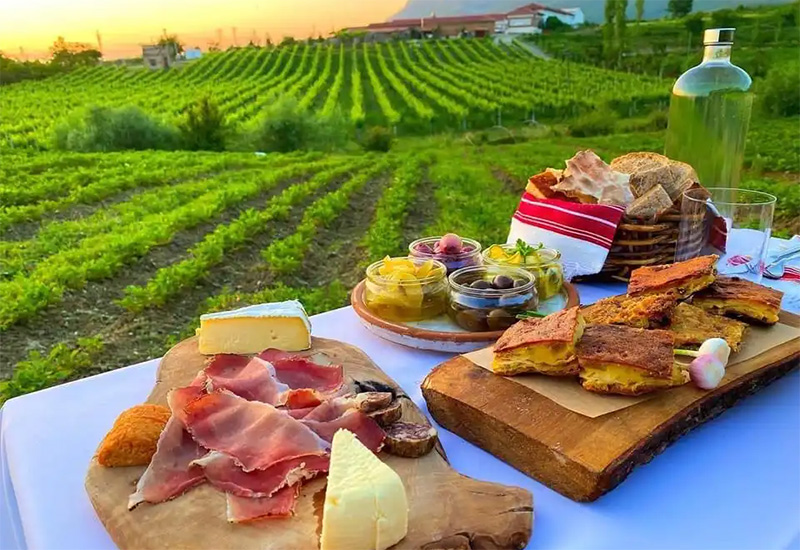Albania boasts a rich culinary tradition influenced by its geography, history, and Mediterranean climate. Menus are characterized by fresh, locally sourced ingredients, traditional cooking methods, and bold yet balanced flavours. The country’s wine culture, dating back thousands of years, is an integral part of its gastronomy, with indigenous grape varieties producing unique and high-quality wines.
Traditional Albanian Cuisine
Albanian chefs draw upon a delightful legacy of Mediterranean, Ottoman, and Balkan influences. Meals are typically centred around fresh vegetables, meats, dairy products, and aromatic herbs. One of the most beloved national dishes is Tavë Kosi, a baked lamb and yogurt casserole that exemplifies the country’s comfort food tradition. Another staple is Fërgesë, a rich and creamy dish made from peppers, tomatoes, and cottage cheese, which can be served as either a side or a main course.
Meat plays a significant role in Albanian cooking, with dishes like qebapa (grilled minced meat sausages) and mish në hell (spit-roasted meat) popular favourites, especially for festive occasions. Fresh seafood is also a highlight in coastal regions like Durrës and Sarandë, where dishes such as tave me peshk (baked fish with vegetables) and midha me oriz (mussels with rice) showcase the country’s maritime heritage.
As in most Mediterranean countries, vegetables and legumes are widely used, with fasule (bean stew) and speca të mbushur (stuffed peppers) being staples on most menus. Bread, particularly byrek, a flaky pastry filled with cheese, spinach, or meat, is standard fare. Dairy products like feta cheese, yogurt, and kaçkavall (a hard cheese) are frequent additions to cooked dishes, or appear served as appetisers.
Those with a sweet tooth will be happy to discover that Albania also has a vibrant tradition of desserts, with baklava, trilece (a milk-soaked sponge cake), and petulla (fried dough served with honey or cheese) being popular sweet treats.
Wine pairings
Albania has a long and rich winemaking tradition dating back over 2 millennia to the Illyrian period. The country’s favourable climate, fertile soil, and high-altitude vineyards create ideal conditions for wine production. International varieties like Merlot and Cabernet Sauvignon are cultivated, but Albania is particularly known for its fascinating indigenous grape varieties.
One of the most renowned native grapes is Kallmet, a robust red wine variety grown mainly in northern Albania. This wine is full-bodied, with rich flavours of dark berries, spice, and earthy undertones. Shesh i Zi, another prominent red grape, produces medium-bodied wines with a balance of fruitiness and acidity.
For white wine lovers, Shesh i Bardhë is a common varietal, known for its crisp floral notes. Offering a refreshing and aromatic taste, another unique Albanian white is Debinë e Bardhë, cultivated mainly in the southern regions,
Traditional winemaking methods are still preserved in many family-run vineyards, and the country’s wine industry is growing, gaining international recognition. Local wineries and wine tours have become popular, allowing visitors to experience the authentic flavours of Albanian wines.
Mediterranean – but with a difference.
All things considered, Albanian food and wine are a testament to the country’s rich cultural heritage and natural abundance. From hearty meat dishes and fresh seafood to unique wines crafted from indigenous grapes, Albania offers a truly distinctive and different culinary experience. Whether dining in a traditional ‘tavernë’ or sipping wine in a picturesque vineyard, exploring Albanian gastronomy is a journey worth taking




